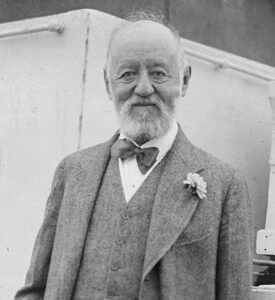
Nathan Straus (January 31, 1848-January 11, 1931) was born in Otterberg, present-day Germany, to Lazarus Straus and his second wife, Sara. After immigrating to the United States in 1854, the family suffered business losses in Georgia during the Civil War, and moved to New York City, where his father formed L. Straus & Sons, a crockery and glassware firm. Nathan and his brothers sold crockery to R. H. Macy & Company department store, later becoming partners in Macy’s and co-owners in 1896. Three years earlier they purchased the Abraham and Weschsler dry goods store in Brooklyn, renaming it Abraham & Straus.
Nathan served on the New York City Parks Commission from 1889 to 1893, and Commissioner of the Department of Health in 1898. He thought about running for mayor of New York in 1894, but his society friends dissuaded him. He and his wife Lina Gutherz privately funded the Nathan Straus Pasteurized Milk Laboratory to combat infant mortality, and opened in Lakewood, New Jersey a Tuberculosis Preventorium for Children. During the Panic of 1893, his milk stations sold coal for the low price of 5 cents for 25 pounds. He opened homeless shelters for 64,000 people who paid a nickel each to get a bed and breakfast. He funded 50,000 meals for one cent each. At Abraham & Straus, he established a subsidized company cafeteria.
U.S. President Howard Taft appointed him in 1911 as the delegate to the International Congress for Protection of Infants in Berlin, and as a delegate in 1912 to the Tuberculosis Congress in Rome. During the winter of 1914, he served more than 1.1 million penny meals for the unemployed. In 1916, he sold his yacht Sisilina to the Coast Guard, and used the proceeds to feed war orphans. He donated money to the New York Public Library, and built a recreational pier on New York City’s waterfront.
In 1904, he visited the Holy Land, prompting him to become a staunch Zionist. He built in Mandatory Palestine soup kitchens for the aged, blind, and physically disabled. He supported workrooms to employ unskilled laborers. He built health stations to treat victims of malaria and trachoma. He broke his leg during a 1912 visit to Palestine and was therefore unable to join his brother Isidor, who drowned when the Titanic sank. Jewish pioneers named the city of Netanya after him, hoping he would contribute money to build their settlement, but Straus had committed his charity elsewhere.
He and Lina had six children: Jerome Nathan, Sara Gutherz, Sara “Sissie,” Roland, Nathan Jr. and Hugh Grant. Sissie married Irving Lehman, who was chief judge of the New York Court of Appeal from 1940 to 1945, when he died. Nathan Jr. served as a New York state senator.
Tomorrow, February 1: Tom Lantos
*
SDJW condensation of a Wikipedia article